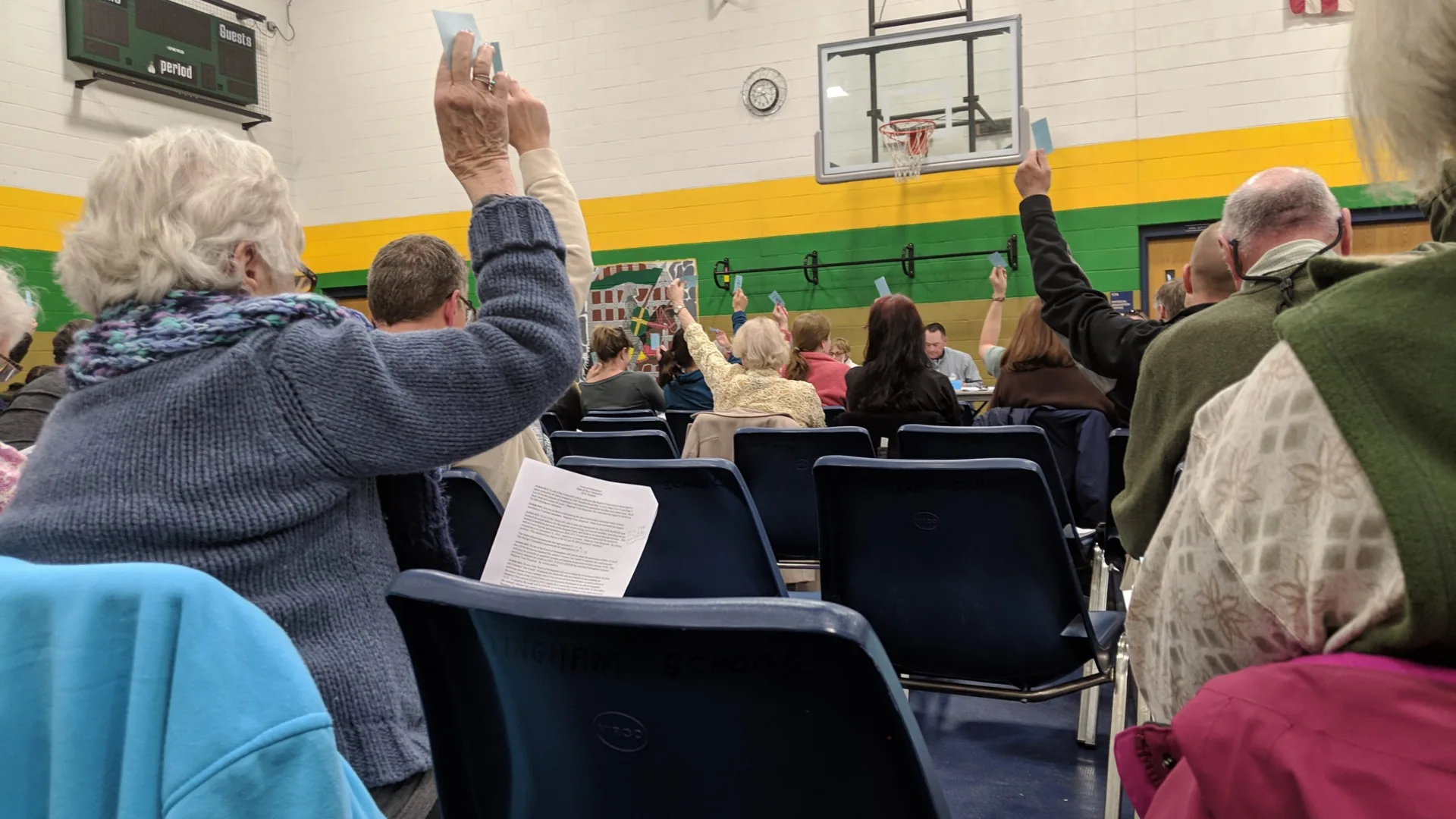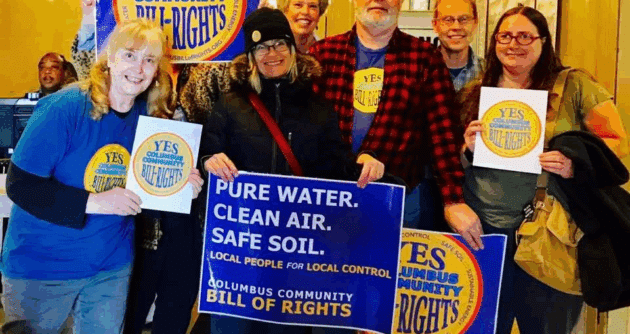FOR IMMEDIATE RELEASE
December 24, 2020
CONTACT:
Michelle Sanborn
Community Environmental Legal Defense Fund
New England Community Organizer
michelle@celdf.org
603-524-2468
Amidst ecological catastrophe, movements for a paradigm shift in law have made global gains in 2020. Granite State judges have chosen to reject a request for a people’s defense of a municipal Rights of Nature and healthy climate law.
‘We are in crisis and the courts are not on our side.’
NOTTINGHAM, NH: As jurisdictions across the globe advance new rights for ecosystems and human rights to a healthy environment in 2020, on December 23, the New Hampshire Supreme Court declined to allow community members to defend the Freedom from Chemical Trespass Ordinance. The ordinance secures rights of ecosystems and the right of townspeople to a climate system capable of sustaining human societies. (It bans all corporate activities that infringe those rights.) Residents of Nottingham, NH, USA had demanded they be allowed to defend this historic law after municipal officials capitulated to corporate intimidation.
“This decision exemplifies how people are shut out of courts in the United States, it further enshrines the courts’ position as a protector of corporate ‘rights’ and elite rule,” says Community Environmental Legal Defense Fund (CELDF) New England Community Organizer Michelle Sanborn. “The courts are a sham.”
“The courts have done it again,” says Gail Mills of the local grassroots group Nottingham Water Alliance (NWA). “They give the benefit of the doubt to the ‘rights’ of corporations, but we can’t even defend the law? We are in crisis and the courts are not on our side.”
The town’s ordinance recognizes rights of ecosystems and residents to be free from corporate chemical trespass and toxic waste dumping. Nottingham residents adopted it through the voter-initiative process at a 2019 Town Meeting. CELDF assisted NWA in drafting the law.
“The community faces corporate threats and a changing climate,” continued Sanborn. “Nottingham residents took the key step of putting into place a legal framework to address the climate crisis locally.”
After passing the law, residents never got a day in court. A corporation sued to intimidate local electeds and overturn the law, claiming its corporate “rights” were being infringed upon. Local politicians folded and the courts proceeded to shut residents out of the courtroom process. This left the ordinance undefended. On December 23, the Supreme Court agreed with corporate interests that residents have no “standing” to defend the law they passed, setting the precedent that local governments can refuse to defend a measure passed by a democratic vote of the people—undermining the autonomy of the initiative power.
“We the People of Nottingham have been SCROOGED by the NH Supreme Court, the lower courts, and our Nottingham Select board who chose not to stand up for our Freedom from Chemical Trespass Ordinance that would protect our health, safety, and ecosystems from corporate polluters,” says Peter White of NWA. “Our rights as residents of Nottingham are being trampled on. The only remedy is a people’s revolution!”
A corporation, G&F Goods, LLC, complained the ordinance unconstitutionally discriminates against corporations. Court proceedings in this case, filed by NWA’s attorney Kira Kelley, include emerging discussions about the specifics of Rights of Nature. To read those or any court documents, reach out to kakelley436@gmail.com or simon@celdf.org.
About CELDF — Community Environmental Legal Defense Fund
The Community Environmental Legal Defense Fund (CELDF) is building a movement for Community Rights and the Rights of Nature to advance democratic, economic, social, and environmental rights – building upward from the grassroots to the state, federal, and international level.
###
FOR IMMEDIATE RELEASE
December 24, 2020
CONTACT:
Michelle Sanborn
Community Environmental Legal Defense Fund
New England Community Organizer
michelle@celdf.org
603-524-2468
Amidst ecological catastrophe, movements for a paradigm shift in law have made global gains in 2020. Granite State judges have chosen to reject a request for a people’s defense of a municipal Rights of Nature and healthy climate law.
‘We are in crisis and the courts are not on our side.’
NOTTINGHAM, NH: As jurisdictions across the globe advance new rights for ecosystems and human rights to a healthy environment in 2020, on December 23, the New Hampshire Supreme Court declined to allow community members to defend the Freedom from Chemical Trespass Ordinance. The ordinance secures rights of ecosystems and the right of townspeople to a climate system capable of sustaining human societies. (It bans all corporate activities that infringe those rights.) Residents of Nottingham, NH, USA had demanded they be allowed to defend this historic law after municipal officials capitulated to corporate intimidation.
“This decision exemplifies how people are shut out of courts in the United States, it further enshrines the courts’ position as a protector of corporate ‘rights’ and elite rule,” says Community Environmental Legal Defense Fund (CELDF) New England Community Organizer Michelle Sanborn. “The courts are a sham.”
“The courts have done it again,” says Gail Mills of the local grassroots group Nottingham Water Alliance (NWA). “They give the benefit of the doubt to the ‘rights’ of corporations, but we can’t even defend the law? We are in crisis and the courts are not on our side.”
The town’s ordinance recognizes rights of ecosystems and residents to be free from corporate chemical trespass and toxic waste dumping. Nottingham residents adopted it through the voter-initiative process at a 2019 Town Meeting. CELDF assisted NWA in drafting the law.
“The community faces corporate threats and a changing climate,” continued Sanborn. “Nottingham residents took the key step of putting into place a legal framework to address the climate crisis locally.”
After passing the law, residents never got a day in court. A corporation sued to intimidate local electeds and overturn the law, claiming its corporate “rights” were being infringed upon. Local politicians folded and the courts proceeded to shut residents out of the courtroom process. This left the ordinance undefended. On December 23, the Supreme Court agreed with corporate interests that residents have no “standing” to defend the law they passed, setting the precedent that local governments can refuse to defend a measure passed by a democratic vote of the people—undermining the autonomy of the initiative power.
“We the People of Nottingham have been SCROOGED by the NH Supreme Court, the lower courts, and our Nottingham Select board who chose not to stand up for our Freedom from Chemical Trespass Ordinance that would protect our health, safety, and ecosystems from corporate polluters,” says Peter White of NWA. “Our rights as residents of Nottingham are being trampled on. The only remedy is a people’s revolution!”
A corporation, G&F Goods, LLC, complained the ordinance unconstitutionally discriminates against corporations. Court proceedings in this case, filed by NWA’s attorney Kira Kelley, include emerging discussions about the specifics of Rights of Nature. To read those or any court documents, reach out to kakelley436@gmail.com or simon@celdf.org.
About CELDF — Community Environmental Legal Defense Fund
The Community Environmental Legal Defense Fund (CELDF) is building a movement for Community Rights and the Rights of Nature to advance democratic, economic, social, and environmental rights – building upward from the grassroots to the state, federal, and international level.
###



